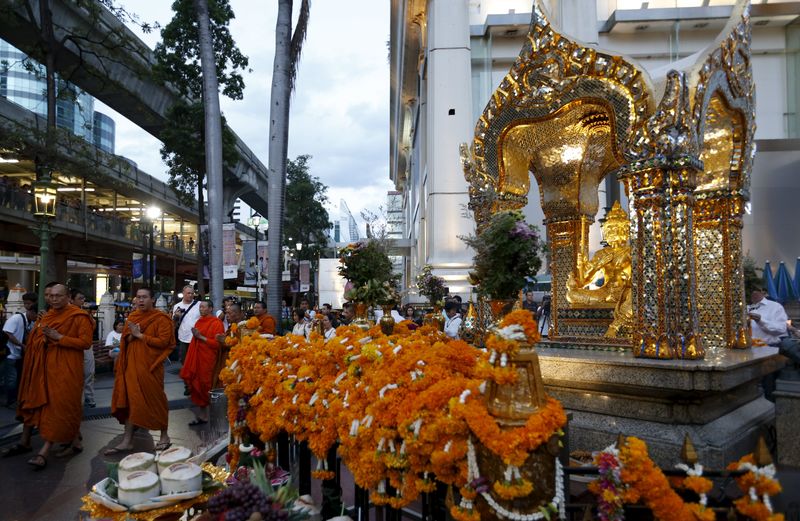By Pairat Temphairojana
BANGKOK (Reuters) - Thailand's worst-ever bombing has caused a 17 percent fall in tourist arrivals, putting pressure on revenues vital to the military government's moves to resuscitate a struggling economy.
Average daily arrivals to Thailand fell from 85,000 before the deadly Aug. 17 attack to 70,000 at present, the tourism ministry said on Wednesday, but officials were confident the slump was temporary and said annual targets remained unchanged.
Fourteen foreigners - seven from mainland China and Hong Kong - were among the 20 people killed in the attack at a famous Hindu shrine in Bangkok's commercial heart, for which the key suspect remains at large.
"The tourism impact ... will probably be a short-term impact," Tourism and Sports Minister Kobkarn Wattanavrangkul told a news conference.
"Tourism will definitely pick up in the fourth quarter."
The government is aiming for 28.8 million arrivals and 2.2 trillion baht ($61.82 billion) in revenue this year from tourism, which has become even more crucial as Southeast Asia's second-biggest economy stutters amid weak exports, manufacturing and retail spending.
The national planning agency has revised down its annual economic growth forecast to 2.7-3.2 percent this year, although experts say that is unrealistic. Growth was just 0.4 percent in April-June from the previous quarter.
With a draw of top-class beaches, food and entertainment, Thailand's tourism makes up about 10 percent of GDP.
The kingdom had 2.1 million visitors between Aug. 1 and Aug 23, a 31.7 percent rise from the same period in 2014, generating 102.8 billion baht, the ministry said. Arrivals from Jan. 1 to Aug. 23, were 19.6 million, also a 31 percent year-on-year increase.
David Scowsill, president of the World Travel and Tourism Council, said tourists jitters would not last.
"Thailand is not going to go through massive levels of trauma," he said. "When we look out at the next six months, there's no indication of wholesale cancellations."
Conferences and meetings, which are key revenue earners, had not been seriously impacted, the ministry said.
Sumate Sudasna, president of the Thailand Incentive and Convention Association, said most large events had gone ahead, including an international surgery congress in Bangkok, at which only 100 of the 2,600 participants had cancelled.
"It's business as usual for Thailand," he added.
But data from ForwardKeys, which tracks over 14 million travel bookings a day, suggests otherwise. Its data for the five days after the bombing compared to the same period in 2014 showed bookings to Thailand down 65 percent and business travel from China tanking 350 percent.
